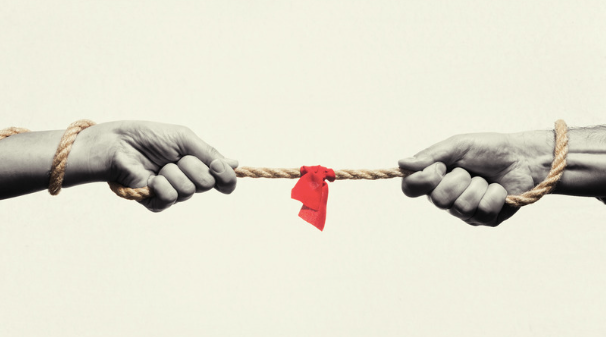Here is the fourth installment of our Exodus series. If you want to take a few minutes to read Exodus 5-6, click HERE. And if you missed the last column in this series, click HERE. Once again, we will walk though the text and highlight aspects that are not typically noticed, and then conclude with a few themes for ecological discipleship. Thoughts and comments are welcome. - James.
__________________________
You Want Me to Do What?
Moses and his sidekick Aaron have garnered the initial support of the Hebrew elders, and are ready to confront Pharaoh. Their request may seem reasonable to us: "This is what the LORD, the God of Israel says, "Let my people go, so that they may hold a festival to me in the wilderness." But Pharoah is the kind of leader who believes that if you give the people an inch, they'll take a mile. He also knows that this not really a minor request, but a straightforward challenge to his power and authority over the Hebrews - let "my" people go! And once again we see wilderness playing a key role in critiquing the hubris and power of the "civilized world."
In response, Pharoah dismisses the request and reiterates his claim to ultimate control: "Who is the LORD, that I should obey him and let Israel go? I do not know the Lord and I will not let Israel go." Lots of "I" statements in there! And then Pharaoh reveals what he truly cares about: "Why are you taking the people away from their labor? Get back to your work....Look, the people of the land are now numerous, and you are stopping them from working." And herein lies Pharaoh's weakness - he has built an empire on the backs of people who, if they did rise up, revolt, and leave, would bring the empire to its knees. He cannot let them go, even for a weekend worship festival.
The request is so dangerous to Pharaoh that not only does he reject the request, he punishes the people for asking. He orders that the slaves who are literally building his empire must no longer be provided straw to make bricks, but their brick quota must stay the same. It is a classic authoritarian move - crush dissent by punishing the dissenters and those around them. Make life so miserable that they will think long and hard before challenging the status quo again. Pharaoh's emphasis on ceaseless production is the exact opposite of God's example of rest on the seventh day of creation. It is a clear example of how the battle lines are drawn between the way of Pharaoh and the way of Yahweh. A great conflict is brewing.
But for now, Pharaoh remains in control, and the people feel the brunt of his cruelty. The Israelite overseers complain to Pharaoh - a courageous move - and are told that they are lazy and that there will be no reprieve. The overseers naturally turn to Moses and Aaron in anger: "You have made us obnoxious to Pharaoh and his officials and have put a sword in their hand to kill us." Moses turns his anger towards God: "Is this why you sent me...you have not rescued your people at all."
This is the place of despair, when acts of faith and sacrifice have not only failed to make things better, they have made them worse.
God's response, which takes up most of Chapter 6, is a long reiteration of promises that start with "I will..." By the end, we are left wondering if the "I" of Pharaoh is stronger than the "I" of Yahweh. The next chapter begins to bring an answer. We will start there in my next column, but let's pause for now to reflect on three themes.

Labor and Rest
We may think that these chapters have little do with ecological discipleship. But we must constantly remind ourselves that humans are creatures within creation. Pharaoh's abuse of the Hebrews is abuse of creation. And it does not take much to imagine that this abuse extends to the non-human world. If the people are working ceaselessly, so are the animals that work alongside them. The Egyptian empire is clearly extractive, built on the backs of those who had no choice but to "work around the clock."
This is an affront to God, who rested on the seventh day of creation - not because creation was fully finished, but because God was instilling rest as a central part of creation. We experience this in the rhythms of the seasons and of sleep. We experience this when we place limits on the time we spend producing whatever it is that comes from our work. This is why it is important to reflect on the forces that keep us from rest, such as cultural expectations that place a high value on economic production or technological innovations that allows us to ignore natural rhythms and limits. Rest is rejuvenating, restorative, and, in the context of these chapters, an act of resistance. What are your rhythms of rest?

Entrenched Power Does Not Give Up Easily
God tells Moses over and over again that Pharaoh will not let the people go, at least not without a fight. In his commentary on these chapters, Old Testament scholar Walter Brueggemann offers us this perspective:
This story holds no brief for an easy kind of supernaturalism that imagines that God will swoop in and cause freedom. Rather, the exodus is wrought slowly, painfully through hurt and risk, through sociopolitical processes that are not unlike our own experience. The notion of "hardening the heart" suggests that God unleashes increasing injustice, stubbornness, and resistance to change, so that the old order must give way to God's new intention. If a benign status quo can be maintained, nothing will ever change. Only when brutality escalates to an unbearable level can genuine public newness surface.
I have been thinking about this in terms of the current resistance to calls for change around issues of racial justice, gender equality, LGBTQ rights, and climate change. Those who have benefited the most from the status quo are the ones who resist the most and, like Pharaoh, do not give up power easily. This text challenges me to see the ways I have benefited from the status quo, and to recognize my own resistance. And it helps me in my work for change, reminding me that it does not happen overnight. In fact, it may often be true that, for the changes we most long to see, sometimes things get worse before they get better. In these moments, there may be nothing else to do but hold onto the promises of God and to each other. If you are in this kind of place as you read this, hold on!
Speaking of Promises..
Let me leave you with the often overlooked words of 2 Peter 3:13: But, in accordance with his promise, we wait for new heavens and a new earth, where righteousness is at home. Such waiting is not passive - God keeps sending Moses back to Pharaoh, and us back to our life and work. Wherever you are on the journey of ecological discipleship, and whatever change you hope to make, keep going. Every step takes us all closer to a world where righteousness is at home.
With you on the Way,
James
I love to hear from you - feel free to leave a comment or email me directly at james.amadon@circlewood.online.
Like what you are reading? Consider joining our supporter community, The Circlewood Stand. Just $10/month makes a huge difference, and makes you part of a growing group of people standing FOR the good of creation and standing WITH Circlewood as we make a difference together. Thanks for considering!